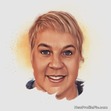A Game of Queens
For the last few weeks, the urge has been strong upon me toplay a game of cards called Queens. Now it is no good having the urge byyourself if you have nobody to play it with because it is not a single playergame. So, the gnawing sense of needing to play has been tumbling around in thewhite noise of the day, creeping into silent gaps, and waving for attention. Iknow the underlying cause, there is a picture of my father on my computer table.He is in the usual stance, shoulders pulled back, arms by his side, and makinga funny face. That’s the way he posed for every single picture that he was inby himself if he knew the snap was coming.
If he was corralled to be in one of our wedding or thechildren’s christening photos, there was still the chance that the developedface would not be “resting face” Dad, but the distorted frame that you got. Whenhe died on February 10th, 2001, the funeral director couldn’t quiteget that proper “resting face” though he was really resting then, because evenin death, Dad had the last chance to make a face (just a little one, but I sawit and smiled).
He is gone 23 years today as I write this. There are notears and not because I don’t miss him or because it’s been 23 years and youcan’t possibly grieve somebody for that long, but because he wouldn’t want it. Andby the way, only people who don’t experience grief put a limit on it. Do yourown grief thing.
The want to have a game of queens is that grief playing inthe background sending subtle reminders that somebody is missing, there’s ahole, and that I miss somebody because of it. Back in the day, we wouldn’t get ourcoats off on any day but would meet Dad walking toward the table with the twodecks of cards and the biggest grin. We'd have to have an all-day game with abreak for a mug up on the first day of a visit. He wore out some decks of cardsand was the most cheerful when he was winning.
He could have had so many reasons not to be cheery becausethere wasn’t a lot of sunshine for him to brag about. His mother died when hewas just a baby, 18 months old, and his dad died when he was a young boy. Helost many of his brothers in their youth and all his siblings moved away. Hewas a young orphan during the Great Depression which couldn't have been easy.He was working when he was twelve. He spent most of WW2 in the Forestry Unit inScotland. He learned to read and write on his own and was dubbed to have agrade 8 education even though he hadn’t stepped inside a schoolhouse. Hemarried at 36 and reared a big family with very little. He moved his house fromJohn's Pond to North Harbour all on his own and board by board and then builtit back up based on the numbers he’d traced on them as he took them down. Then,not too many years later the house burnt, and five of his ten children weregone. How much more we know nothing about because he never spoke of nor dwelledon hard times.
My father had a reverence for the past. He liked to talkabout this old fellow or that old fellow and who he was related to and how. He’dbe so proud to know of all the connections we’ve made to relatives in far awaylands that are his great nieces and nephews through DNA and my writing. When myoldest daughter was around eighteen months old, he asked me to bring her in oneNovember day. She was born on his birthday, and he wanted to see how big he waswhen his mother died. He still had memories of her.
As a young girl, I spent lots of time “in the country” withhim at rabbits or trouting or picking berries. Bakeapples, especially, requireda long hike of more than an hour to get to the right marshes. He had lots ofpatience with young legs and carried us across rivers on his back no matter howmany of us went. And there was always a mug up or two somewhere during thedays. He’d light a fire and boil a can of water for tea or bring a thermos ortwo. The pause in the day was important to him. When all of us got moreinterested in throwing berries at each other than picking, he’d round us up(not mad or impatient) and we’d head for home.
He also didn’t miss a day going to the church. No matter theweather, he’d rig up to step over our fence and make his way to the church fora few prayers. Even when he broke his ankle, he still went until later in lifewhen his body didn’t allow him to go any longer. He continued to pray at home.
He was resilient because he had to be, a man of faith becausehe wanted to be, kind because he knew the value of it, happy because he alsoknew the value of that, and so many more great things that he passed on. Thougha man of solitude, he was the epitome of a father by all accounts when we weregrowing up. I have lots of great memories of all the love that was shown in somany untraditional ways.
We’ve all got stories of how we came quietly into being. Myfather’s wasn’t remarkable by no means, but like many things, extraordinaryhappens when nobody is looking. Now I have to round up a crew to have a game ofqueens.



